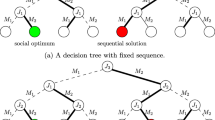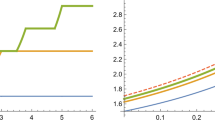Abstract
We consider the classical machine scheduling, where n jobs need to be scheduled on m machines, and where job j scheduled on machine i contributes \(p_{i,j}\in \mathbb {R}\) to the load of machine i, with the goal of minimizing the makespan, i.e., the maximum load of any machine in the schedule. We study inefficiency of schedules that are obtained when jobs arrive sequentially one by one, and the jobs choose themselves the machine on which they will be scheduled, aiming at being scheduled on a machine with small load. We measure the inefficiency of a schedule as the ratio of the makespan obtained in the worst-case equilibrium schedule, and of the optimum makespan. This ratio is known as the sequential price of anarchy (SPoA). We also introduce two alternative inefficiency measures, which allow for a favorable choice of the order in which the jobs make their decisions. As our first result, we disprove the conjecture of [22] claiming that the sequential price of anarchy for \(m=2\) machines is at most 3. We show that the sequential price of anarchy grows at least linearly with the number n of players, assuming arbitrary tie-breaking rules. That is, we show \(\mathbf{SPoA} \in \varOmega (n)\). Complementing this result, we show that \(\mathbf{SPoA} \in O(n)\), reducing previously known exponential bound for 2 machines. Furthermore, we show that there exists an order of the jobs, resulting in makespan that is at most linearly larger than the optimum makespan. To the end, we show that if an authority can change the order of the jobs adaptively to the decisions made by the jobs so far (but cannot influence the decisions of the jobs), then there exists an adaptive ordering in which the jobs end up in an optimum schedule.
Access this chapter
Tax calculation will be finalised at checkout
Purchases are for personal use only
Similar content being viewed by others
Notes
- 1.
When each player chooses deterministically one machine, this definition is obvious. When equilibria are mixed or randomized, each player chooses one machine according to some probability distribution, and the social cost is the expected makespan of the resulting schedule.
References
Abed, F., Correa, J.R., Huang, C.-C.: Optimal coordination mechanisms for multi-job scheduling games. In: Schulz, A.S., Wagner, D. (eds.) ESA 2014. LNCS, vol. 8737, pp. 13–24. Springer, Heidelberg (2014). https://doi.org/10.1007/978-3-662-44777-2_2
Andelman, N., Feldman, M., Mansour, Y.: Strong price of anarchy. Games Econ. Behav. 2(65), 289–317 (2009)
Angelucci, A., Bilò, V., Flammini, M., Moscardelli, L.: On the sequential price of anarchy of isolation games. J. Comb. Optim. 29(1), 165–181 (2013). https://doi.org/10.1007/s10878-013-9694-9
Anshelevich, E., Dasgupta, A., Kleinberg, J.M., Tardos, É., Wexler, T., Roughgarden, T.: The price of stability for network design with fair cost allocation. SIAM J. Comput. 38(4), 1602–1623 (2008)
Awerbuch, B., Azar, Y., Richter, Y., Tsur, D.: Tradeoffs in worst-case equilibria. Theoret. Comput. Sci. 361(2), 200–209 (2006)
Azar, Y., Fleischer, L., Jain, K., Mirrokni, V., Svitkina, Z.: Optimal coordination mechanisms for unrelated machine scheduling. Oper. Res. 63(3), 489–500 (2015)
Bilò, V., Flammini, M., Monaco, G., Moscardelli, L.: Some anomalies of farsighted strategic behavior. Theory Comput. Syst. 56(1), 156–180 (2015). https://doi.org/10.1007/978-3-642-38016-7_19
Caragiannis, I.: Efficient coordination mechanisms for unrelated machine scheduling. Algorithmica 66(3), 512–540 (2013)
Caragiannis, I., Fanelli, A.: An almost ideal coordination mechanism for unrelated machine scheduling. Theory Comput. Syst. 63(1), 114–127 (2018). https://doi.org/10.1007/s00224-018-9857-2
Chen, B., Potts, C.N., Woeginger, G.J.: A review of machine scheduling: complexity, algorithms and approximability. In: Du, D.Z., Pardalos, P.M. (eds.) Handbook of Combinatorial Optimization. Springer, Boston (1998). https://doi.org/10.1007/978-1-4613-0303-9_25
Christodoulou, G., Koutsoupias, E., Nanavati, A.: Coordination mechanisms. Theor. Comput. Sci. 410(36), 3327–3336 (2009). Graphs, Games and Computation: Dedicated to Professor Burkhard Monien on the Occasion of his 65th Birthday
Cole, R., Correa, J.R., Gkatzelis, V., Mirrokni, V., Olver, N.: Decentralized utilitarian mechanisms for scheduling games. Games Econ. Behav. 92, 306–326 (2015)
Correa, J.R., de Jong, J., de Keijzer, B., Uetz, M.: The inefficiency of Nash and subgame perfect equilibria for network routing. Math. Oper. Res. 44(4), 1286–1303 (2019)
Correa, J.R., Queyranne, M.: Efficiency of equilibria in restricted uniform machine scheduling with total weighted completion time as social cost. Naval Res. Logist. (NRL) 59(5), 384–395 (2012)
Czumaj, A., Vöcking, B.: Tight bounds for worst-case equilibria. ACM Trans. Algorithms 3(1), 4:1–4:17 (2007)
Epstein, L.: Equilibria for two parallel links: the strong price of anarchy versus the price of anarchy. Acta Informatica 47(7), 375–389 (2010)
Even-Dar, E., Kesselman, A., Mansour, Y.: Convergence time to Nash equilibria. In: Baeten, J.C.M., Lenstra, J.K., Parrow, J., Woeginger, G.J. (eds.) ICALP 2003. LNCS, vol. 2719, pp. 502–513. Springer, Heidelberg (2003). https://doi.org/10.1007/3-540-45061-0_41
Feldmann, R., Gairing, M., Lücking, T., Monien, B., Rode, M.: Nashification and the coordination ratio for a selfish routing game. In: Baeten, J.C.M., Lenstra, J.K., Parrow, J., Woeginger, G.J. (eds.) ICALP 2003. LNCS, vol. 2719, pp. 514–526. Springer, Heidelberg (2003). https://doi.org/10.1007/3-540-45061-0_42
Fiat, A., Kaplan, H., Levy, M., Olonetsky, S.: Strong price of anarchy for machine load balancing. In: Arge, L., Cachin, C., Jurdziński, T., Tarlecki, A. (eds.) ICALP 2007. LNCS, vol. 4596, pp. 583–594. Springer, Heidelberg (2007). https://doi.org/10.1007/978-3-540-73420-8_51
Finn, G., Horowitz, E.: A linear time approximation algorithm for multiprocessor scheduling. BIT Numer. Math. 19(3), 312–320 (1979). https://doi.org/10.1007/BF01930985
Fotakis, D., Kontogiannis, S., Koutsoupias, E., Mavronicolas, M., Spirakis, P.: The structure and complexity of Nash equilibria for a selfish routing game. In: Widmayer, P., Eidenbenz, S., Triguero, F., Morales, R., Conejo, R., Hennessy, M. (eds.) ICALP 2002. LNCS, vol. 2380, pp. 123–134. Springer, Heidelberg (2002). https://doi.org/10.1007/3-540-45465-9_12
Hassin, R., Yovel, U.: Sequential scheduling on identical machines. Oper. Res. Lett. 43(5), 530–533 (2015)
Hoeksma, R., Uetz, M.: The price of anarchy for Minsum related machine scheduling. In: Solis-Oba, R., Persiano, G. (eds.) WAOA 2011. LNCS, vol. 7164, pp. 261–273. Springer, Heidelberg (2012). https://doi.org/10.1007/978-3-642-29116-6_22
Immorlica, N., Li, L.E., Mirrokni, V.S., Schulz, A.S.: Coordination mechanisms for selfish scheduling. Theoret. Comput. Sci. 410(17), 1589–1598 (2009)
de Jong, J., Uetz, M.: The sequential price of anarchy for atomic congestion games. In: Liu, T.-Y., Qi, Q., Ye, Y. (eds.) WINE 2014. LNCS, vol. 8877, pp. 429–434. Springer, Cham (2014). https://doi.org/10.1007/978-3-319-13129-0_35
Koutsoupias, E., Mavronicolas, M., Spirakis, P.: Approximate equilibria and ball fusion. Theory Comput. Syst. 36(6), 683–693 (2003). https://doi.org/10.1007/s00224-003-1131-5
Koutsoupias, E., Papadimitriou, C.: Worst-case equilibria. In: Meinel, C., Tison, S. (eds.) STACS 1999. LNCS, vol. 1563, pp. 404–413. Springer, Heidelberg (1999). https://doi.org/10.1007/3-540-49116-3_38
Leme, R.P., Syrgkanis, V., Tardos, É.: The curse of simultaneity. In: Proceedings of Innovations in Theoretical Computer Science (ITCS), pp. 60–67 (2012)
Pinedo, M., Hadavi, K.: Scheduling: theory, algorithms and systems development. In: Gaul, W., Bachem, A., Habenicht, W., Runge, W., Stahl, W.W. (eds.) Operations Research Proceedings 1991. Operations Research Proceedings 1991, vol 1991. Springer, Heidelberg (2012). https://doi.org/10.1007/978-3-642-46773-8_5
Tranæs, T.: Tie-breaking in games of perfect information. Games Econ. Behav. 22(1), 148–161 (1998)
Zhang, L., Zhang, Y., Du, D., Bai, Q.: Improved price of anarchy for machine scheduling games with coordination mechanisms. Optim. Lett. 13(4), 949–959 (2018). https://doi.org/10.1007/s11590-018-1285-3
Acknowledgment
We are grateful to Thomas Erlebach for spotting a mistake in an earlier proof of Theorem 6 and for suggesting a fix of the proof. We thank Paul Dütting for valuable discussions. We also thank anonymous reviewers and seminar participants of OR 2016 for suggestions that improved the paper.
Author information
Authors and Affiliations
Corresponding author
Editor information
Editors and Affiliations
Rights and permissions
Copyright information
© 2020 Springer Nature Switzerland AG
About this paper
Cite this paper
Chen, C., Giessler, P., Mamageishvili, A., Mihalák, M., Penna, P. (2020). Sequential Solutions in Machine Scheduling Games. In: Chen, X., Gravin, N., Hoefer, M., Mehta, R. (eds) Web and Internet Economics. WINE 2020. Lecture Notes in Computer Science(), vol 12495. Springer, Cham. https://doi.org/10.1007/978-3-030-64946-3_22
Download citation
DOI: https://doi.org/10.1007/978-3-030-64946-3_22
Published:
Publisher Name: Springer, Cham
Print ISBN: 978-3-030-64945-6
Online ISBN: 978-3-030-64946-3
eBook Packages: Computer ScienceComputer Science (R0)




